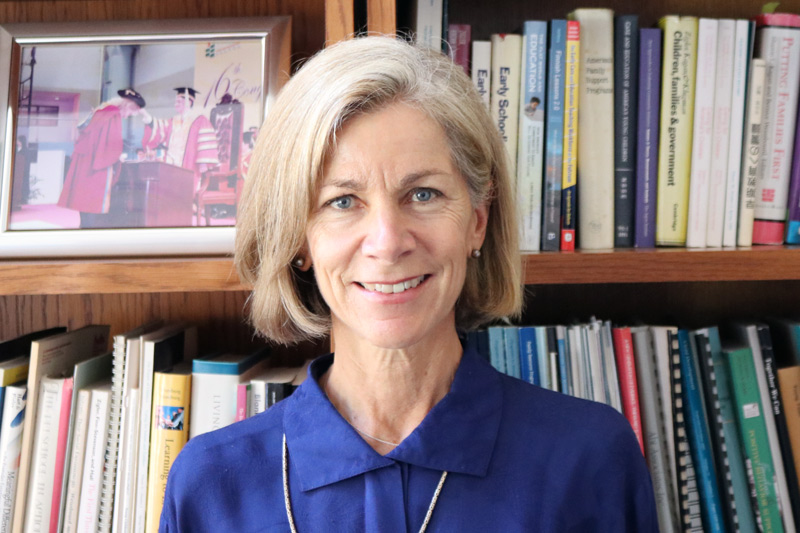As New York City’s Universal Pre-K for All (PKA) is consolidated into a single effort managed by the Department of Education, a new study by Teachers College’s National Center for Children and Families (NCCF) points to ways in which this ambitious effort can deliver more uniform quality across the many programs serving young children, while still allowing providers to address the specific needs of children.
“PKA programs are currently provided by school- and community-based early childhood centers, each with different resources, strengths, and challenges. Both have much to offer children,” said NCCF Research Scientist Jeanne Reid, one of the study’s authors. “Quality across the system could be improved by addressing structural differences in resources, administration, professional development, and programs’ capacity to meet the varied needs of children, families, and communities across programs in a diverse city.”

ADDRESSING STRUCTURAL DIFFERENCES Reid says that quality across the system could be improved by cross-pollinating the different resources and strengths of school- and community-based early childhood centers.
The study compared the implementation of the PKA initiative in community-based programs and schools, which have been overseen by different government entities and with different resources. Overall, researchers found that differences in PKA implementation have more to do with the program oversight and resources than with the socio-economic makeup of the neighborhoods in which programs are located.
For example, community-based organizations perform better than schools in providing support services for families, ranging from mental health care to parenting classes. However, schools do better on a measure of instructional quality that is linked to gains in child learning. The findings suggest that the goal of uniform quality could be accomplished by pollinating approaches across the system while allowing program providers to adapt early education to the specific needs of the children and diverse communities they serve.
The city’s ongoing efforts to consolidate PKA administration presents an important opportunity to make a promising system better for all children, regardless of the provider or neighborhood. “The city should continue to work on addressing structural differences between schools and early childhood centers that hinder uniform quality across providers,” says another of the study’s authors, NCCF Co-Director Sharon Lynn Kagan, Virginia and Leonard Marx Professor of Early Childhood and Family Policy. “For example, in community-based programs, insufficient teacher and administrator compensation may foster teacher turnover, hindering programs that tend to serve the highest-need children.”
The study recommends that as the city moves to a unified system, it could build upon its recent salary-parity efforts for universal pre-k teachers to further address differentials in salaries and benefits among both teachers and administrators across settings. The study also points to the need to reconsider budgeting and staff support to program leaders; assure that all teachers are allowed time for reflective practice and professional learning opportunities; deepen the involvement of social workers to support both children and family well-being; and, foster equitable enrollment to promote the diversity of children served within each setting.
The research found that differences in PKA implementation have more to do with the program oversight and resources than with the socio-economic makeup of the neighborhoods in which programs are located.
This research was made possible by The New York City Early Childhood Research Network, a unique partnership of researchers from the city’s higher education institutions who work with the New York City Department of Education, New York City Administration for Children’s Services, New York City Department of Health and Mental Hygiene, Mayor’s Office for Economic Opportunity, and the New York Early Childhood Professional Development Institute to study the implementation of New York City’s universal preschool program and use the knowledge gained to improve instruction and outcomes for all children. The research was funded by the Foundation for Child Development. The New York City Early Childhood Research Network is a project of the New York Early Childhood Professional Development Institute at the City University of New York and is funded by Early Childhood Partners NYC, Foundation for Child Development, Heising-Simons Foundation and the W. Clement & Jessie V. Stone Foundation.
In addition, Children and Youth Services Review has published “Building a unified system for universal Pre-K: The case of New York City,” a paper by Reid, NCCF Graduate Research Fellow Samantha Melvin, Kagan, and Jeanne Brooks-Gunn, NCCF Co-Director and Virginia and Leonard Marx Professor of Child and Parent Development and Education, which draws on this same research.
New York City is making progress on establishing an important model for universal preschool. Providing universal access to high-quality preschool across all settings could give parents better options, while encouraging diversity of enrollment in programs, leading to richer intellectual, socio-emotional, and cultural experiences that create better outcomes for all children.
